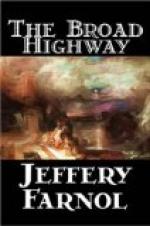“And mine, as I tell you,” said he, “has been an altogether riotous one. Thus each of us, though by widely separate roads—you by the narrow and difficult path of Virtue, and I by the broad and easy road of Folly—have managed to find our way into this Howling Destitution, which we will call Nowhere-in-Particular. Then how does your path of Virtue better my road of Evil?”
“The point to be considered,” said I, “is not so much what we now are, but rather, what we have done, and may ultimately be, and do.”
“Well?” said he, turning to look at me.
“For my own achievements, hitherto,” I continued, “I have won the High Jump, and Throwing the Hammer, also translated the works of Quintilian, with the Satyricon of Petronius Arbiter, and the Life, Lives, and Memoirs of the Seigneur de Brantome, which last, as you are probably aware, has never before been done into the English.”
“Ha!” exclaimed Mr. Beverley, sitting up suddenly, with his ill-used hat very much over one eye, “there we have it! Whoever heard of Old Quin—What’s-his-name, or cared, except, perhaps, a few bald-headed bookworms and withered litterateurs? While you were dreaming of life, and reading the lives of other fellows, I was living it. In my career, episodically brief though it was, I have met and talked with all the wits, and celebrated men, have drunk good wine, and worshipped beautiful women, Mr. Vibart.”
“And what has it all taught you?” said I.
“That there are an infernal number of rogues and rascals in the world, for one thing—and that is worth knowing.”
“Yes,” said I.
“That, though money can buy anything, from the love of a woman to the death of an enemy, it can only be spent once—and that is worth knowing also.”
“Yes,” said I.
“And that I am a most preposterous ass!—and that last, look you, is more valuable than all the others. Solomon, I think, says something about a wise man being truly wise who knoweth himself a fool, doesn’t he?”
“Something of the sort.”
“Then,” said he, flinging his hat down upon the grass beside him, “what argument can you advance in favor of your ’Narrow and Thorny’?”
“The sum of eight shillings and sixpence, a loaf of bread, and a slice of noble cheese, now no more,” said I.
“Egad!” said he, looking at me from the corners of his blue eyes, “the argument is unanswerable, more especially the cheese part, against which I’d say nothing, even if I could.” Having remarked which, he lay flat on his back again, staring up at the leaves, and the calm serenity of the sky beyond, while I filled my negro-head pipe from my paper of tobacco, and forthwith began to smoke.
And, presently, as I sat alternately watching the blue wreaths of my pipe and the bedraggled figure extended beside me, he suddenly rolled over on his arm, and so lay, watching me.
“On my soul!” he exclaimed at length, “it is positively marvellous.”




